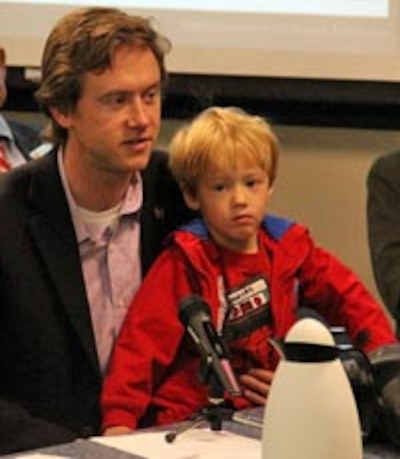The State Board of Education recently took a break from its usual agenda of reports, regulations and licensing decisions to take a four-hour crash course in some of the knottiest issues facing education, from Common Core Standards to multi-state tests to the federal role in education.

The seminar, featuring four panels of experts, was kind of a swan song for SBE chair Bob Schaffer of Fort Collins, who is leaving the board after serving since January 2006.
Schaffer, a conservative Republican former congressman, has been involved in education issues since he entered the state Senate in 1987. He’s known for his unequivocal support of unfettered parent choice, skepticism about some education reforms and disdain for federal interference in education. He’s currently principal of Liberty Common High School in Fort Collins, a high-performing charter school.
He organized the Dec. 6 hearing as a way to have experts weigh in on issues that concern him and many others in education. Here’s how the session was described – at length – in board documents:
“Topics to be examined include the implementation and impact of the Common Core Standards, Colorado’s participation in PARCC, and federal initiatives such as NCLB, ESEA, the U.S. Department of Education’s “waiver” strategy, Race-To-The-Top, and other similar initiatives. Panelists will provide expert insight on these topics with an emphasis on whether programs are compatible with Colorado’s objectives and strategies for its public schools. Panelists will also discuss financial implications including opportunity costs, academic advantages for Colorado students and families, quality, and compatibility with Colorado’s tradition and constitutional directive regarding ‘local control.’”
Participants in the four panels that addressed the board ranged from Colorado teachers and superintendents to out-of-state scholars, and much of the discussion focused on the Common Core Standards for language arts and math, adopted for Colorado by the board in 2010.
Those standards have become a focal point of debate, with supporters arguing they are needed to improve American education and critics claiming they are low quality and a stalking horse for increased federal control of schools.
The out-of-state experts were generally critical. Theodor Rebarber, CEO of the national advocacy group Accountability Works, warned of “a push uniformity” and urged the board to “step back” on the standards.
Referring to the “low quality” of the standards, Sandra Stotsky, a professor at the University of Arkansas, added, “Nobody knows how low it is going to be.”
But Aurora Superintendent John Barry argued strongly for the standards.
“I do fully support the continuation of the Common Core Standards,” Barry said. “This issue was not a federal imposition. … It is one of the most stellar examples of states’ rights and local control.”
He also dismissed warnings about a coming national curriculum.
“There’s no evidence of that.”

State Sen. Mike Johnston, a key figure in recent education reform legislation, talked about the “fundamental benefits of the Common Core” and compared individual state standards to incompatible computer operating systems that can’t communicate with each other.
Schaffer appeared unconvinced by defenders of the standards.
“I don’t share the same comfort,” Schaffer said. “If I could vote today I would vote to disconnect from the Common Core. … I want better, not common.”
He added, “This will drive curriculum. … If anybody believes there will be much variance [among states], I just don’t see how that’s going to occur.”
George Sparks, CEO of the Denver Museum of Nature and Science, seemed impatient with all the debate.
“We need to get on with it,” Sparks said. “Just get something on the table.”
A voice from the trenches piped up during the hearing.
Ron Castagna, principal of Lakewood High School, was critical of education reform in general and testing in particular, among other things.
“I look at school reform measures as random and arbitrary. … What we have done is a travesty, and we need to slow down and take a deep breath. … We watch data, not students.”
Other State Board action
The first part of the SBE’s monthly meeting, on Dec. 5, followed a more standard pattern. The board approved 2012 school performance ratings (see story) and took the following actions of note.
School readiness
The board approved a Department of Education plan for rollout of school readiness assessments of children entering school. Assessing the readiness of such students is required by the 2008 Colorado Achievement Plan for Kids law, and school districts are supposed to start doing so in the 2013-14 school year.
The issue has become controversial in the early childhood community because the department currently is recommending use of only one test, known as Teaching Strategies GOLD. (Get more information on that assessment here.) While GOLD is widely used now by districts participating in the Colorado Preschool Program, some educators have been concerned that the assessment isn’t appropriate for students entering kindergarten and is too burdensome to use.
CDE staff, saying to other assessments haven’t been fully checked out, recommended that districts could use GOLD to start but could choose from other assessments after they’re ready for use next year. The board had a lengthy discussion of the issue in November but approved the staff recommendation unanimously on Wednesday. (See this summary of the staff recommendation for more details.)
While “assessment” is widely used in education circles as a synonym for “test,” these early childhood assessments aren’t tests but rather are a structured system of observation and record keeping by teachers.
Environmental education
The board voted 5-2 to approve a state “environmental education plan.” The plan is required by a 2010 law but really isn’t a major initiative or mandate, given that the state can’t dictate curricula to local districts.
Still, some Republican members of the board were concerned that the program would allow environmental ideologies to infiltrate science teaching. GOP board members Paul Lundeen of the 5th District and Debora Scheffel of the 6th District voted no on the plan.
Learn more for yourself with this description of the plan, the full text of the plan and this fact sheet.
